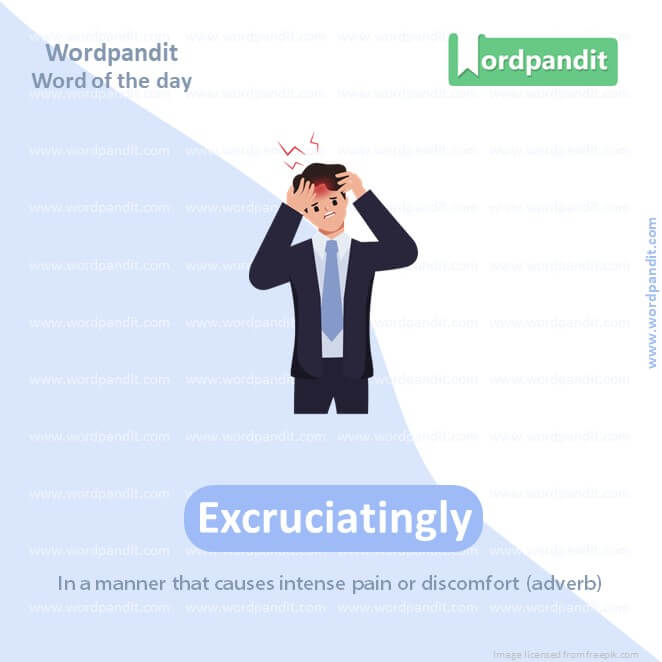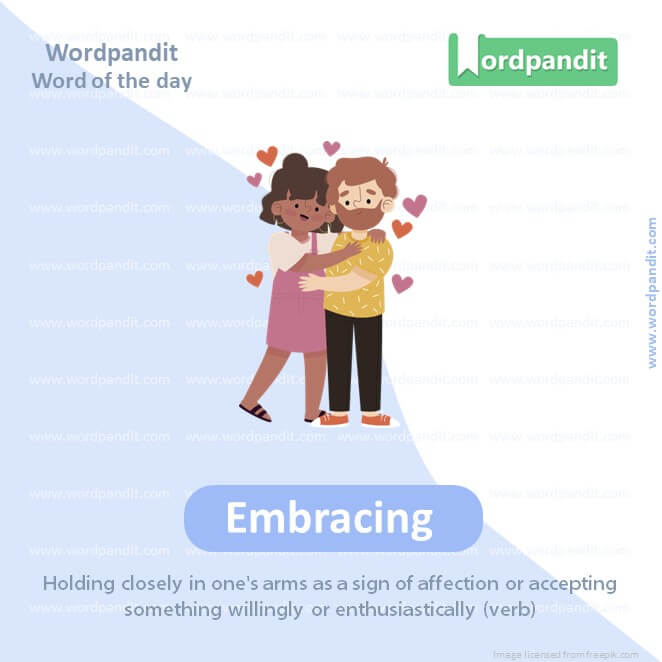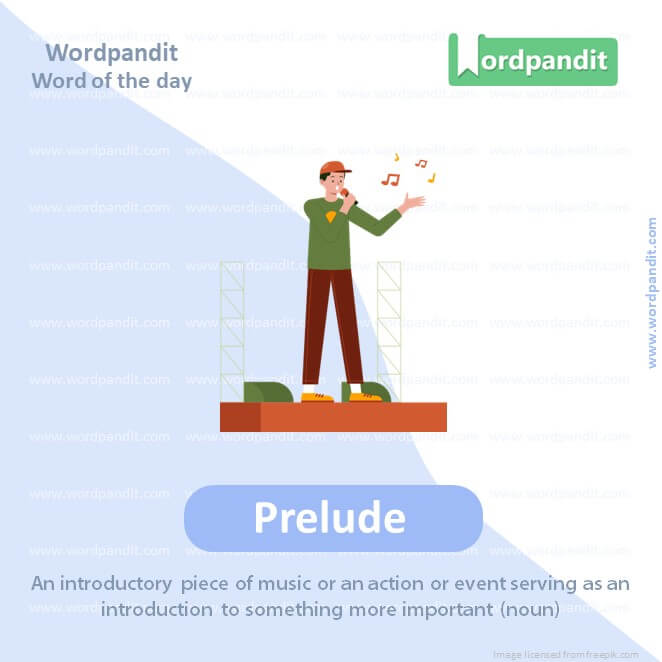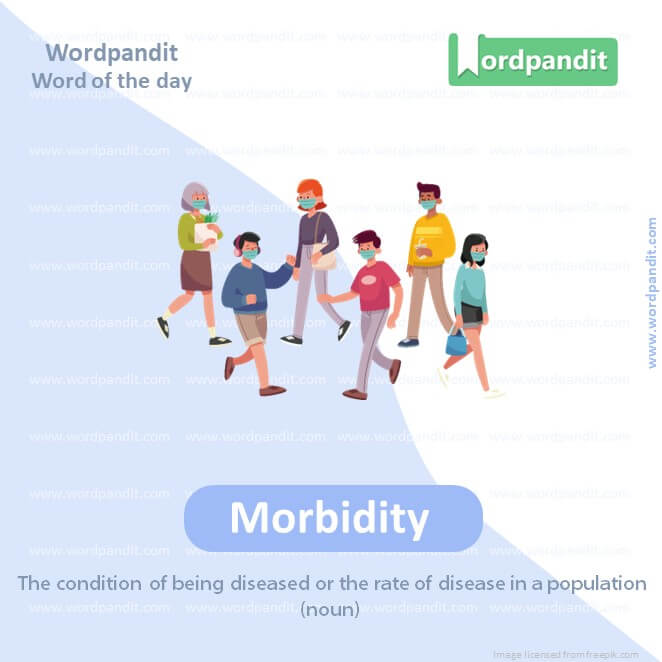Daily Vocabulary Words: List of Daily Used Words
Hi there. Welcome to this special section @ Wordpandit.
Our endeavour here is straightforward: highlighting important daily vocabulary words, you would encounter in The Hindu. This is your repository of commonly used words; essentially, we are posting a list of daily used words. Hence, this has significant practical application as it teaches you words that are commonly used in a leading publication such as The Hindu.
Visit the website daily to learn words from The Hindu.

WORD-1: Excruciatingly
CONTEXT: In a contest of excruciatingly small margins, Rohit Sharma’s men prevailed with a seven-wicket victory with speedsters Jasprit Bumrah and Mohammed Siraj being the wreckers-in-chief of the South African line-up.
SOURCE: The Hindu
EXPLANATORY PARAGRAPH: Imagine you have a tiny cut, and it hurts a lot. Now, imagine something hurts even more than that, so much that you can’t stop thinking about it. That’s what “excruciatingly” means. It’s used when something hurts really, really badly or is extremely uncomfortable.
MEANING: In a manner that causes intense pain or discomfort (adverb).
PRONUNCIATION: eks-kroo-shee-ay-ting-lee
SYNONYMS: Agonizingly, Intensely, Severely, Intolerably, Unbearably, Torturously
USAGE EXAMPLE:
1. The headache was excruciatingly painful.
2. He described the wait as excruciatingly long.
3. The sun was excruciatingly hot that day.
4. She found the loud noise excruciatingly unbearable.
WORD-2: Obnubilate
CONTEXT: Prevention is better than cure, but taking this adage to the extreme in the practice of medicine might obnubilate the very purpose of treating patients to recovery, and even turn out to be counter-productive.
SOURCE: The Hindu
EXPLANATORY PARAGRAPH: Think about a foggy morning when you can’t see much because the fog covers everything. “Obnubilate” is like that but for ideas. It means to make something unclear or hard to understand, just like fog makes it hard to see.
MEANING: To make unclear or obscure (verb).
PRONUNCIATION: ob-noo-bi-late
SYNONYMS: Obscure, Cloud, Confuse, Blur, Muddle, Veil
USAGE EXAMPLE:
1. The true meaning was obnubilated by complex language.
2. The fog seemed to obnubilate the entire valley.
3. Her explanation only served to obnubilate the subject further.
4. He tried to obnubilate his mistake with vague excuses.

WORD-3: Italicises
CONTEXT: the Health Ministry has thrown up startling statistics, but more importantly, examining the minutiae italicises key issues that have been flagged by experts for years now.
SOURCE: The Hindu
EXPLANATORY PARAGRAPH: When you see words that are slanted to the side in a book or on a computer, that’s called “italicises.” It’s a way to make certain words stand out or show they are important or different.
MEANING: Writes or prints text in a slanted style to emphasize it (verb).
PRONUNCIATION: i-tal-i-sigh-zes
SYNONYMS: Slants, Stresses, Highlights, Accentuates, Emphasizes, Underlines
USAGE EXAMPLE:
1. The title of the book is italicised for emphasis.
2. She italicises important words in her notes.
3. The word “not” was italicised for clarity.
4. In the document, foreign words were italicised.
WORD-4: Erratic
CONTEXT: The Newlands surface with erratic bounce and adequate juice for the seamers to excel, tested the very best of willow wielders.
SOURCE: The Hindu
EXPLANATORY PARAGRAPH: Erratic is like when you can’t guess what will happen next. It’s used for things that don’t have a set pattern or order, like when someone keeps changing their mind or when a butterfly flies in all directions.
MEANING: Not regular or predictable; inconsistent (adjective).
PRONUNCIATION: eh-rat-ik
SYNONYMS: Unpredictable, Inconsistent, Irregular, Unstable, Capricious, Variable
USAGE EXAMPLE:
1. His behavior was erratic and confusing.
2. The car moved in an erratic path.
3. Her attendance at school was erratic.
4. The stock market has been erratic this week.

WORD-5: Embracing
CONTEXT: In a short-form embracing cricketing world, Tests not lasting five days is a cause for worry and it also reveals a waning of batting skills.
SOURCE: The Hindu
EXPLANATORY PARAGRAPH: Think of hugging someone you like a lot. “Embracing” is like that, but it’s also used when you accept something happily, like a new idea or change.
MEANING: Holding closely in one’s arms as a sign of affection or accepting something willingly or enthusiastically (verb).
PRONUNCIATION: em-bray-sing
SYNONYMS: Hugging, Accepting, Welcoming, Adopting, Enclosing, Enfolding
USAGE EXAMPLE:
1. She is embracing her new role at work.
2. They were seen embracing at the airport.
3. The community is embracing the changes.
4. He’s embracing new challenges with excitement.

WORD-6: Prelude
CONTEXT: In the larger scheme, India drew the T20s at 1-1 and won the ODI series at 2-1, which became the prelude to the Tests.
SOURCE: The Hindu
EXPLANATORY PARAGRAPH: A prelude is like the beginning part of a story or a song. It’s the part that comes first and sets up what’s going to happen next, like an introduction.
MEANING: An introductory piece of music or an action or event serving as an introduction to something more important (noun).
PRONUNCIATION: prel-yood
SYNONYMS: Introduction, Prologue, Beginning, Overture, Foreword, Lead-in
USAGE EXAMPLE:
1. The short film served as a prelude to the main movie.
2. The speech was a prelude to her resignation.
3. Dark clouds were a prelude to the storm.
4. The piano prelude was beautifully played.
WORD-7: Exacerbated
CONTEXT: While it is the nature of pathogens to evolve, this ever-increasing crisis is constantly being exacerbated by unsound medical, and animal husbandry practices.
SOURCE: The Hindu
EXPLANATORY PARAGRAPH: Imagine you have a small problem, but then something happens that makes it a much bigger problem. That’s what “exacerbated” means. It’s when something gets worse or more intense.
MEANING: Makes a bad situation or problem worse (verb).
PRONUNCIATION: ig-zas-er-bay-ted
SYNONYMS: Worsens, Intensifies, Aggravates, Complicates, Heightens, Increases
USAGE EXAMPLE:
1. His rude comment exacerbated the argument.
2. The delay only exacerbated our problems.
3. Her allergy was exacerbated by the dust.
4. The economic crisis was exacerbated by the war.

WORD-8: Morbidity
CONTEXT: It is precisely the sort of misuse and overuse of antimicrobials, as revealed by the survey, which cause the development of drug-resistant pathogens that in turn pose great risk to life and exacerbate morbidity.
SOURCE: The Hindu
EXPLANATORY PARAGRAPH: Morbidity is a word doctors use. It means being sick or having a disease. It’s not just about one illness, but about all the different ways people can be unwell.
MEANING: The condition of being diseased or the rate of disease in a population (noun).
PRONUNCIATION: mor-bid-i-tee
SYNONYMS: Illness, Sickness, Unhealthiness, Diseased state, Pathology, Ailment
USAGE EXAMPLE:
1. The study focused on the morbidity of the virus.
2. There’s an increasing morbidity rate in the area.
3. His morbidity was caused by poor lifestyle choices.
4. The doctor discussed the morbidity associated with smoking.
WORD-9: Exhilarating
CONTEXT: The current trend resting on a muscular approach makes for exhilarating viewing but when batting line-ups collapse, it is equally disconcerting.
SOURCE: The Hindu
EXPLANATORY PARAGRAPH: Think about a time when you felt really happy and excited, like when you’re playing your favorite game. “Exhilarating” is a word that describes that amazing, super fun feeling.
MEANING: Making one feel very happy, animated, or elated; thrilling (adjective).
PRONUNCIATION: ig-zil-uh-ray-ting
SYNONYMS: Exciting, Thrilling, Stimulating, Invigorating, Electrifying, Energizing
USAGE EXAMPLE:
1. The roller coaster ride was exhilarating.
2. She found the news exhilarating.
3. The hike up the mountain was exhilarating.
4. It was an exhilarating performance.
WORD-10: Disconcerting
CONTEXT: The current trend resting on a muscular approach makes for exhilarating viewing but when batting line-ups collapse, it is equally disconcerting.
SOURCE: The Hindu
EXPLANATORY PARAGRAPH: When something is disconcerting, it makes you feel unsure or uncomfortable. It’s like when you see something unexpected and don’t know what to think about it.
MEANING: Causing one to feel unsettled or confused (adjective).
PRONUNCIATION: dis-kun-sert-ing
SYNONYMS: Unsettling, Disturbing, Discomfiting, Perturbing, Disquieting, Troubling
USAGE EXAMPLE:
1. His sudden change in attitude was disconcerting.
2. She found his stare disconcerting.
3. The news was disconcerting to everyone.
4. It was disconcerting to hear such strange noises at night.
Vocabulary
Language is a confluence of thoughts, emotions, and experiences that find vibrant expression through words. In this spectrum, ‘vocabulary’ shines as a critical aspect that shapes and directs our language proficiency. It offers depth, nuance, and clarity to our expressions. However, mastering ‘vocabulary’ is an art that requires a strategized approach.
An intensive strategy for learning ‘vocabulary’ goes beyond the limiting precincts of memorization. Instead, it nudges learners towards comprehension and application. To understand ‘vocabulary’, take a step forward from traditional textbooks and classroom sessions, and embrace the vast world of books, articles, podcasts or digital content in the language you are learning. This step allows you to understand words in context, see how they are used in different situations, and absorb words as part of the natural flow of language.
As you journey through ‘vocabulary’, remember that this expedition should not be a race. Rather, it’s a marathon where pacing yourself is pivotal to long-term success. Learning a few words each day and consolidating your knowledge through regular revision tends to be more effective, as it prevents cognitive overload and promotes solid retention.
Interactive learning tools can provide valuable support in assimilating ‘vocabulary’. Use of flashcards, language-learning apps, or memory-enhancing software can make this process more engaging and effective, reinforcing the ‘vocabulary’ in your memory.
Lastly, practice is an incontrovertible part of mastering ‘vocabulary’. Utilize the learnt vocabulary in your daily conversations, write-ups, or presentations to ensure an active application. Doing this fosters recall and cements understanding.
In summation, learning ‘vocabulary’ is a journey that should be embraced with an integrated approach, where understanding and application are the key elements. By engaging with diverse learning resources, pacing the learning process, employing interactive learning tools, and practicing regularly, the journey of mastering ‘vocabulary’ becomes a fulfilling and enriching experience.













